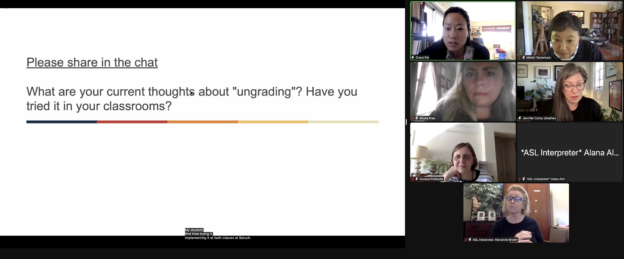During this interactive roundtable event, five TLH Faculty Fellows – Jennifer Corby (Kingsborough Community College), Nicole Kras (Guttman Community College), Grace Pai (Guttman Community College), Dusana Podlucka (LaGuardia Community College), and Midori Yamamura (Kingsborough Community College) – shared their experiences of implementing ungrading in their courses. They were joined by 10 of their students who discussed how ungrading has helped and/or hindered their learning process.
The event, which was attended by 84 participants, began with an introduction to how ungrading is a student-driven approach that emphasizes feedback, assessment and reflection of the learning process over scores, mastery of skills, or standardized outcomes. The fellows collected student definitions, opinions and reflections of ungrading through a survey form taken by 52 students (see slides and booklet of student reflections).
The five Fellows then shared examples of ungrading across various disciplines. Professor Corby shared how she gave options for “choose-your-own adventure” activities and had students complete self-assessments in her Introduction to U.S. Government & Politics course. Professor Yamamura’s Global Contemporary Art students attended 8 asynchronous events that were part of the UnHomeless NYC exhibition she organized; students worked on group reflections and held consultations with her to help them incorporate their reflection of ungrading in their final papers. For her Civic Engagement in a Global Society first year experience (FYE) course, Professor Pai implemented a system of self grading, peer grading, monthly learning journal entries, an end-of-semester individual grade conference, and most importantly – student-created rubrics on major assignments where students discussed what makes for a quality assignment submission before creating a rubric with definitions and points for weighted categories as a class. Students in Professor Kras’ Human Services Fieldwork and Integrative Seminar course submitted weekly written, audio, video, or visual art reflections – alongside creating their own self-grading criteria connected to the purpose of the assignment. Finally, Professor Podlucka discussed how she focused more on providing student feedback on weekly reading responses, in addition to feedback on the process of writing a staged research paper for her Social Psychology course.

Ten student panelists (listed below) then shared their experiences and perceptions of being ungraded. Following are some examples of student responses.
What I liked is how we get to speak about this with the professor during her office hours. It was such a good feedback experience. We could talk about our assignments. We could talk about what we are doing right, which way is the right way, which way is the wrong way. That was a new way of learning. The grading system, when you get a good grade, you don’t exactly know why. When you don’t get a good grade, we still can’t ask why. We just know we didn’t do good and that’s it. In this, we literally had a step-by-step guide from the professor where we are going wrong and what we have to do. It was less pressure for both the professor and the students. Learning was fun with this system.
I would say it helped my learning process because it enabled me to reconsider power dynamics in the classroom. Something to consider in grading is like why is the professor doing the grading, why doesn’t my input matter? I feel like ungrading tackled that and empowered me to seek out feedback, using it more effectively, prioritizing it so I can learn from it and improve. So that’s one of the biggest outcomes I’ve retained and I’m really thankful for it.
We’ve done projects before like based in math which isn’t my strong suit, but when it comes to ungrading, we actually made the rubric for it. We could say my strong suit is this, may not be this but I need to put effort towards it. It was a give and take relationship where we could say what we wanted to put effort in, what we thought was important. The might seem small in the eyes of a teacher but whatever you think is important, you can say I want this to reflect in my project. You don’t really see that in my other classes. It’s invigorating. Maybe you spent hours on one small thing and you are finally getting recognition for it.
While students overwhelmingly expressed positive experiences with “ungrading,” there were also identified challenges and concerns noted from both faculty and students. One student shared, “I also don’t really like grading myself because I feel as though there’s always room for improvement. I feel like who do you think you are?” Faculty and participants in the chat shared concerns with implementing this approach in larger courses, on how to communicate this novel way of thinking about grading to students and colleagues, and how to align this practice with university grading requirements.
Student panelists
- Nabeela Hashim, Kingsborough Community College
- Elias Goldstein, Kingsborough Community College
- Caroline Sorial, Kingsborough Community College
- Holliday Senquiz, Guttman Community College
- Deborah Bereket, Guttman Community College
- Lishon Vesprey, Guttman Community College
- Miyoko Wong, Guttman Community College
- Brenda Quinio, LaGuardia Community College
- Jessica Carranza, LaGuardia Community College
- Stephanie Tapia, LaGuardia Community College


